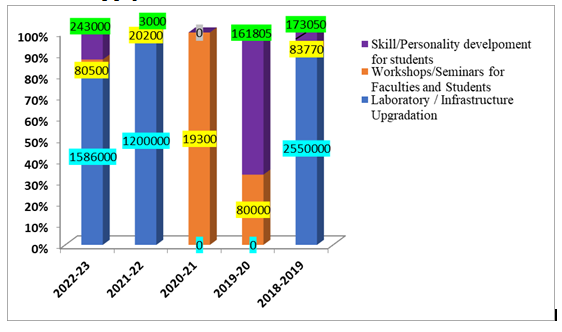Best Practice 1
1. Title of the Practice
Promotion of Indian Languages and Preservation of Culture and Heritage.
2. Objectives of the Practice
To foster Indian languages to preserve culture and heritage.
To develop students’ creative and aesthetic sensibilities.
3. Context
Sanskrit was floated in our institution as a language comprehending ethics, moral values and culture.
Scientific research done under the label “Sanskrit Effect” has proved that it has the power to expand
memory and cognitive abilities. It is a computer-friendly language that can help develop AI robotics and
data mining.
Given the importance of translation, in mutual understanding and careers, a Post-Graduate Diploma
Course in Translation was initiated, the first of its kind in Goa. Syllabus was designed by our faculty.
Four languages offered here have honours programmes, thus offering great flexibility to language
learners.
Contributions of great Indian personalities are emphasized in the curriculum, letting students be inspired
and motivated towards fulfilling social and national responsibilities.
4. Practice
A two-year diploma and certificate course in Sanskrit was initiated in 2018 as part of an MoU with
Rashtriya Sanskrit Saunthan, New Delhi. Participants are exposed to Geeta Phatanan, Vishwa Sanskrit
Diwas, Raksha Bhandhan, Guru Pournima, Shakapanah (Sabji Bazar) Shlok Pathan. The college is an
examination centre for Sanskrit.
MoUs with state-level language associations, such as Institute Menezes Braganza, Gomantak Rastra
Bhasha Vidyapith, Prayas and Sane Guruji Kathamala has helped to promote Viksit Bharat through
languages.
Scholarships awarded by Konkani Akademi to boost students’ interest in Konkani.
Students’ participation in activities like Tulsi Jayanti, Premchand Jayanti, Sane Guruji, Kusumagraj,
Shivaji Maharaj, Swami Vivekananda, allows them to understand the legacy of Indian stalwarts.
Their participation in college/state/national-level competitions and festivals, such as CMS Vatavaran
Film Festival, Maha Marathi Sahitya Sammelan, Serendipity Arts Festival, Science Film Festival, D. D.
Kosambi Festival of Ideas, has helped develop talents, cultural and environmental awareness.
Competitions were organized as part of Hindi RajBhasha Saptah. Language departments conducted
seminars and guided projects on literary personalities.
The college has provided platform for Hindustani Classical Music, Varasa, Dandiya, Flute, Tabla,
Harmonium, Ghumat, and tiatra, Bonderam, Kite Flying. São João, Chikal Kalo, etc.
5. Evidence of Success
1. In the last five years, 271 candidates (age group, 8-80 years) successfully completed diploma and
certificate courses in Sanskrit, thereby strengthening IKS.
2. Eleven students completed post-graduate diploma in translation, got paid internships and are now
employed.
3. Students developed their talents in performing arts, which included drama, classical singing and script
writing, thus supporting language conservation. Short films produced by our students were screened at
IFFI (Goa) and Pune Short Film Festival.
4. Students employed in the print and electronic media in various capacities regularly write on issues pertaining to culture and heritage.
6. Problems encountered and resources required
1. Limited financial resources available for students opting for theatre as a career.
2. Government must float financial schemes to motivate youth to participate in cultural preservation and
promotion.
3. Students need to dedicate additional hours to perfect their skills alongside academics.
============================================================================
Best Practice 2
1. Title of the Practice
Creation of a Resource Pool for Advanced Learning and Skilling
2. Objectives of the Practice
To strengthen industry-academia linkage and collaborate with other non-Government
organizations
To approach industry, private parties, Government (other than Higher Education) and NGOs to
secure funds for infrastructure development.
To create state-of-the-art infrastructure required for performing experiments in postgraduate and
research curriculum.
To procure funds from NGOs and Philanthropists for enriching student skills, to impart
knowledge and transform lives.
To motivate faculty to submit research proposals and publish their work in peer-reviewed
journals.
Spearheading Knowledge Dissemination through Resource Mobilisation/Generation
3. The Context
College initiated a total of 23 new programmes in the past five years, in Arts, Science and Commerce
streams, requiring quick financial support from Government for purchase of books, teaching-learning
facilities, salaries of newly-recruited faculty, laboratory equipment, etc., to meet the essential conditions
to secure University approval. A steady monetary flow is required to sustain the programmes, especially
in the Science stream. Government procedures for purchase of equipment is elaborate. Hence, industry
and NGOs were approached to fund infrastructure development, scholarships and personality
development programmes. UGC and NEP 2020 foster industry-academia linkage and procurement of aid
through CSR systems. Both Government and industries in the vicinity were approached, viz. Vedanta
Sesa Goa; Syngenta Bioscience; Toshvin; Deccan Fine Chemicals; Goa Shipyard; Goa Konkani
Akademi; Rotary Club of Panaji; GIPARD; Goa State Biodiversity Board.
4. The Practice
1. A sound proposal to obtain funds as per their terms and conditions has been submitted by faculty
to Industries and NGOs.
2. Upon procurement of equipment, faculty were inspired and motivated to write project proposals
and seek further assistance from DST/UGC/DBT/GSBB, among others. Thus, faculty and
students could publish their work.
3. An ecosystem of research culture and knowledge transfer was created among students and faculty
by holding workshops, seminars and conferences.
4. It was sought to generate responsible skilled workforce by organizing personality development
programmes for Arts and Commerce students.
5. Evidence of Success:
1. Total funding of Rs. 1,14,35,625/- was received from NGOs, industry and philanthropists in the
last five years.
2. Rs. 53,46,000/- was utilized on laboratories to conduct fundamental experiments in MSc
Chemistry, MSc Microbiology and advanced research of PhD students.
3. Faculty received guideships and published 15 research papers in reputed journals; and 6 Research
project proposals got sanctioned.
4. Seminars, conferences, training and cultural programmes were organized to enhance experiential
and participative learning.
5. Skilled human resource from Commerce and Arts streamed ready for placement.
6. Despite the hitches during Covid-19 pandemic, academic aspects could be effectively continued
in view of the availability of funds. The success story of research mobilization is represented in
the graph:

6. Problems Encountered and Resources Required:
Research involves focused thought processes and work after teaching hours.
Large funds are required to sustain scientific research.
Time management by faculty, students and stakeholders is required for projects involving primary data collection.